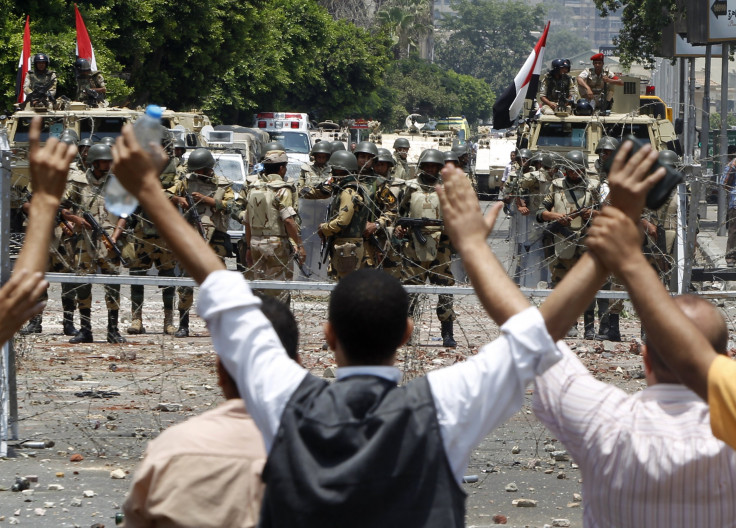Egypt’s Army Opens Fire On Mohamed Morsi Supporters In Cairo Killing Dozens; Ultra-Conservative Nour Party Withdraws Support For Interim Government

The Egyptian army opened fire on supporters of ousted President Mohamed Morsi early Monday morning near a military building in Cairo where the former president is being held, killing at least 42 people and wounding 200, and intensifying a standoff between the army and Morsi’s Muslim Brotherhood organization.
The military said “a terrorist group” launched an attack on the Republican Guard compound, killing one army officer and wounding 40, which prompted the army to return fire, Reuters reported. The death toll was confirmed by Egypt’s health officials, according to Reuters.
The Brotherhood’s spokesman Gehad El-Haddad disputed the military’s account of the events, saying the army fired at Muslim Brotherhood supporters while they were praying, during a nonviolent sit-in outside the Republican Guard barracks.
The Guardian's Ian Black in Cairo said on a live blog: “Accounts of what happened at the Republican Guard compound are starkly conflicting ... it (is) one of the worst incidents in the country’s turbulent history since the overthrow of Hosni Mubarak in February 2011.”
Shortly after the shooting, Nour, Egypt's second-biggest Islamist party, which had been supporting Morsi’s opponents so far, said it was pulling out of talks to form an interim government, in protest of what it described as the “massacre at the Republican Guard (compound),” Reuters reported.
“We've announced our withdrawal from all tracks of negotiations as a first response,” party spokesman Nader Bakar said in a post on Facebook.
Earlier, the candidacy of prominent opposition leader Mohamed ElBaradei, a Nobel laureate and former U.N. diplomat, to serve as the new prime minister, was suspended, due to opposition from the Nour Party, which said he was too liberal and divisive.
Nour senior leaders had threatened to quit negotiations to form an interim government if ElBaradei were appointed as the prime minister, leading to speculation that the fall of the Brotherhood could pave the way for more-conservative Nour to increase its influence, Los Angeles Times reported.
State-run Al-Ahram and other Egyptian media reported on Sunday that Ziad Bahaa El-Din, a founding member of the Egyptian Social Democratic Party, was chosen as the new front-runner to become the prime minister.
El-Din was closely linked to former president Hosni Mubarak’s administration, serving as an economic adviser and head of Egypt's General Authority for Investment during Mubarak’s reign.
ElBaradei could still become vice president, Al-Ahram reported, although interim government officials said final decisions were yet to be made regarding both positions.
Meanwhile, the Turkish foreign minister Ahmet Davutoglu condemned the shooting at the Republican Guard compound and was quoted in the Guardian as saying, “I strongly condemn the massacre that took place in Egypt at morning prayer in the name of the fundamental human values which we have been advocating.”
The Egyptian army sealed off traffic near the Rabaa Adawia mosque, which lies close to the Republican Guard compound where Morsi’s supporters are staging demonstrations and also shut down two main bridges across the Nile river, Reuters reported, citing witnesses.
© Copyright IBTimes 2025. All rights reserved.




















